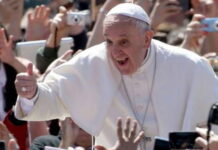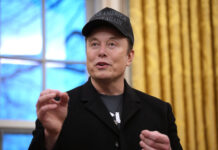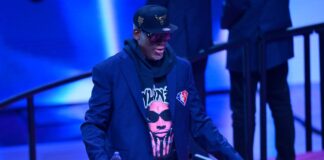Dillon Mohamed is an ambitious young political leader in Guyana. And he’s gay.
In an interview, he discusses his LGBTI activism, his faith and his politics.
CLICK to receive an email notice of each new article on Erasing 76 Crimes

Dillon Mohamed is a politically active, religiously active, gay air traffic controller in Guyana, which is the only South American country with a law against homosexuality.
Erasing 76 Crimes interviewed him recently to discuss his background, his faith, his political ambitions and his work on behalf of Guyana’s sexual minorities.
76crimes: Please tell us a little about yourself.
Dillon Mohamed: “I’m almost 30 years old and I’ve lived my whole life in my city, Georgetown, the capital of my country, Guyana. This country inspires me tremendously, always, all the time and I can’t see myself living anywhere else. I am a big fan of the ethnic and sexual diversity of my country, because I am mixed race and gay and I was lucky enough to live with an Indian father and a black mother who passed on their respective cultural heritages.
After high school, where I took French, I went on to study theater and dramatic arts before earning a degree in Protestant theology. Also, I am very grateful to have grown up in a free and urban environment that was able to foster my initiatory and eclectic path in life.
Today, spiritually, I have become an omnist [a person who respects all religions]. Professionally, I have become an air traffic controller and, to tell the truth, nothing predisposed me to this in life except my curiosity. It is this curiosity that has allowed me to become the independent adult that I am today, without denying my heritage.

76crimes: How did you become a political activist and an activist for the rights of LGBTI people in your country?
Dillon Mohamed: I first became an activist for sexual and gender minorities because I am gay myself. Guyana’s law that provides for incarceration for oral or anal sex is just an aberration. And even though this repressive body of law is no longer enforced, it remains because of the lack of consensus among the political class and the fierce opposition of religious fundamentalists.
However, there have been advances, because people like [member of parliament and Alliance for Change leader] Cathy Hughes or me have gotten involved in political parties to say that we exist and that we need to change society.
In addition, under President Granger between 2015 and 2020 there have been notable advances, with the decriminalization of cross-dressing in November 2018 and the organization of the first Pride March in the history of the country, the same year.

More broadly, the political issues of equality in Guyana are close to my heart, as the social, ethnic (Chinese, Indian, Afro-descendants, Amerindians, Europeans), sexual and religious mosaic of the country is not reflected in the economy, employment or capital ownership.
That is why I plan to run for the country’s highest office one day, becoming Guyana’s first gay president, although I realize that is not going to happen anytime soon. For the time being, corruption, ethnic clientelism, racial hatred and even homophobia still hold a great deal of sway and are used as management tools for social regulation.
Yet we are a great oil country, but a lot of funds are allocated to subsidize private investments that are not very productive, while inflation undermines purchasing power and the welfare state remains the great absentee of public policies.
However, my spiritual values push me to consider that life requires respecting balances. Today in Guyana, among the youth, there is a real demand for social equality. [They are responding] to an economy that produces inequalities, to the detriment of the black, Amerindian, LGBTI or mixed-ancestry populations.

76crimes: Along with your commitment to sexual and gender minorities, as you mention, you have a strong spiritual grounding and commitment. Could you talk more about that?
Dillon Mohamed: With the support of the executive director of the Society Against Sexual Orientation Discrimination (SASOD), Joel Earl Simpson, we were able to establish the first LGBTI-inclusive and open Christian congregation on Sunday, Jan. 5, 2020, without discrimination, under the name Hope of Christ United Anglo-Catholic Church.
At the time, this caused an uproar across the country, but since then the tension has subsided and in the meantime there has been Covid-19. The pandemic, and then the lockdown, took the motivation out of many of us. Covid-19 disrupted everything and many people were busy working and surviving after not being economically active for several months. Some even left Guyana to find economic opportunities elsewhere when the borders reopened.
Finally, the departure of our pastor from the church, after the confinement, was very detrimental to the continuation of our religious activity. So for the time being, we can say that our church is dormant. Moreover, the youth tend more and more to be secularized. However, I continue to do rehearsals at the piano, singing praises to God, because that is what I like.

Previous articles on the English-speaking Caribbean :
- 2022 in worldwide LGBT rights progress – Part 2: Latin America and Caribbean (January 3, 2022, 76crimes.com)
- No final victory yet in Trinidad, says LGBTQ rights activist Jason Jones (December 7, 2022, 76crimes.com)
- Jamaica: homophobia’s last stand (November 21, 2022, 76crimes.com)
- Jamaica keeps denying LGBT rights even after being ordered to shape up (September 26, 2022, 76crimes.com)
- Courts are the key to expanding LGBTQ rights in the Caribbean (September 22, 2022, 76crimes.com)
- Letter: No action against Jamaican football boss for anti-gay comments. Why? (September 20, 2022, 76crimes.com)
- Caribbean court overturns Antigua buggery law (July 5, 2022, 76crimes.com)
- Jamaican LGBTQ activist tells of sexual and spiritual awakenings (January 24, 2022, 76crimes.com)
Other articles about the Guiana Shield :








